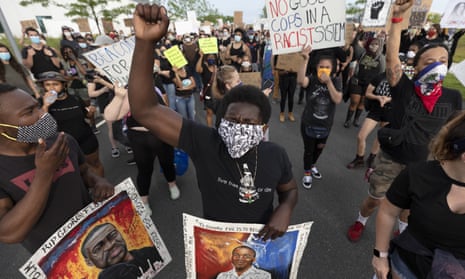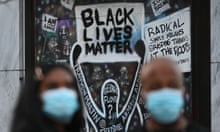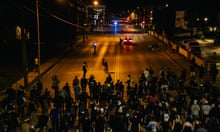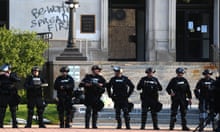As the Covid-19 virus continues to spread unevenly across the world, politicians and opinion pages in the US are already blaming new cases of coronavirus on mass demonstrations against police violence and racism. The protests are a visible example of public crowds, and the ideal scapegoat for problems that are far more complex. Some leaders have treated them with overt hostility. But have protests really played a critical role in spreading new cases of coronavirus? The best science suggests probably not a lot.
Let me be clear: I’m not minimising the risk of mass demonstrations during a pandemic. Indeed, there is almost nothing we do at the moment that doesn’t carry some risk of contagion, and it is undoubtedly true that they will lead to some new cases. But the big question is by how much, and whether there are ways to minimise this risk. Here, the answer is largely in favour of the outdoor protests over other large gatherings planned, such as indoor campaign rallies.
The evidence is becoming clear that wearing a mask can substantially lower the risk of spread and severity of illness. We are seeing more and more masks worn by protesters. A second feature of gatherings that affects the spread of the virus is whether they happen outdoors or indoors. Here, too, research suggests that outdoor activities are much safer than indoor ones.
Finally, although this is more preliminary, evidence suggests that if you’re going to be in a crowd, a mobile one is better than a stationary one. None of these three aspects will protect you from infection definitively – but together they offer a modest level of risk reduction. And compared with the risk of catching Covid-19 that is present in many jobs or other activities, such as working in meat-packing plants, outdoor protests are likely to be much safer– especially if we carry out testing, which can quickly reveal if the virus is spreading among protesters, as Massachusetts has done recently.
It is also clear that there is a serious risk and grave public health cost to not addressing systemic racism against black people in America. Racism and police violence against black people is an epidemic, and the black community has faced the worst of coronavirus – both in mortality rates and economic fallout. The killings of George Floyd, Ahmaud Arbery and Breonna Taylor are the latest in a long history of brutality against black people in America, and have brought the urgency of this crisis to the forefront of public consciousness.
So, let’s be honest. Protests will result in more infections, with the greatest burden falling on black communities. But the number of people infected is likely to be lower than you might expect. A growing body of evidence indicates that the vast majority of infections occur in so-called super-spreader events, almost all of which take place indoors. The risk of infection from outdoor protests is further reduced by the striking consistency with which demonstrators wear masks, and often make efforts to maintain personal distance. The evidence to date suggests that if people adhere to these practices, mass demonstrations will produce more coronavirus cases, but not an avalanche.
Some US states with rising rates of infection, such as Arizona, Texas and Florida, began easing the lockdown before the recent protests began, without having met the federal government’s reopening criteria for reopening, including downward trends in cases and rates of positive tests. And scientific evidence suggests that the risk of returning to offices and shopping centres is probably greater than participating in large demonstrations. The crucial exception, of course, is when they are met with mass arrests. Throwing peaceful protesters into police vans and jails is unquestionably a recipe for mass infection.
Systemic racism has innumerable health consequences. One new study suggests that one in 1,000 African American men is killed by the police. Telling people to stay home for reasons of public health denies this acute crisis that people are feeling. It won’t work.
Instead, our public health guidance must carefully weigh trade-offs and mitigation strategies. We must explicitly acknowledge the public health impacts of both the pandemic and systemic racism. Protests will lead to infections, but our public health communications should clearly emphasise that the risk can be mitigated with symptom checks and tests (where available) before participation; masks, eyewear, and distancing, where possible; and testing and self-quarantine, where possible, afterwards. We should be actively sharing guidance on How to Protest Safely, as Amnesty International and others have done.
If we are to confront systemic racism, such mass demonstrations seem “essential”, to use our new pandemic lexicon. People feel a deep need to be part of them. There is no moral equivalence to be drawn between protests and pool parties, sports games or indoor rallies. History teaches us that civic protests are how nations get better. Now, more than ever, they are essential.









